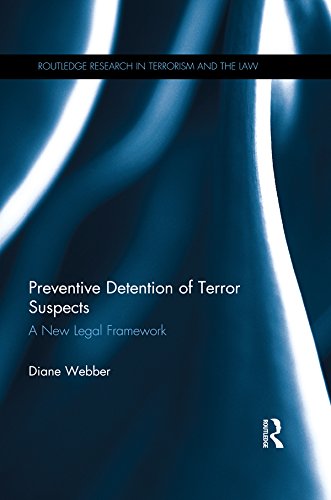In Preventive Detention of Terror Suspects: A New Legal Framework, Diane Webberoffers a comprehensive analysis of preventive detention as a much-criticised counter-terrorism tool, examining the legal frameworks relating to the detention of terror suspects across multiple jurisidictions, including the UK, the US, Australia, Canada, India, Israel and France. I welcome this as a timely and valuable reference point for those researching this controversial topic.
Diane Webber has written a book whose time has arrived – though it should also be noted that preventive detention has been a significant impediment to rights throughout the twentieth and twenty-first centuries. While many would argue that preventive detention should not be used in counter-terrorism as it is rife with rights abuses, Preventive Detention of Terror Suspects: A New Legal Framework provides a pragmatic approach to the issue, offering recommendations for what the author believes may curb human rights violations, while noting the right of states to use the measure. The focus of this book is an overview of legal frameworks that pertain to the detention of terror suspects in multiple jurisdictions, providing thoroughly researched contemporary policies and legal cases in these areas.
The introduction offers multiple theoretical examples and analysis to the reader, which may be helpful if this is your first foray into issues of detention and law. The book is nicely structured, first introducing the relevant provisions in international human rights law, including regional mechanisms, and international humanitarian law, discussing jurisdictional issues in particular. Webber indicates what many scholars believe to be the United States’ flawed interpretation of their jurisdiction as it applies to detention in Afghanistan, Iraq and Guantanamo Bay, as well as Israel’s claim that the International Covenant on Civil and Political Rights (ICCPR) – a foundation of the international human rights law and treaty to which Israel is party – does not apply to the Occupied Territories. A brief analysis of the drafting of the ICCPR follows, and debates surrounding the interpretation of relevant articles of it as they relate to the United States’ position are highlighted.
The second chapter fleshes out detention provisions under the ICCPR as well as regional systems, focusing on the meaning of ‘arbitrary detention’ and ‘preventive detention’. The phrase ‘arbitrary arrest and detention’ is found in all established regional human rights instruments. Webber refers to the United Nations Department of Economic and Social Affairs Report on the ‘Right of Everyone to be Free from Arbitrary Arrest, Detention and Exile’, which indicates that this phrase should be interpreted as meaning that ‘arrest or detention is arbitrary if it is (a) on grounds or in accordance with procedures other than those established by law, or (b) under the provisions of a law the purpose of which is incompatible with respect for the right to liberty and security of person.’ However, there have been various interpretations of these phrases, which Webber outlines, including a brief discussion of the travaux preparatoires of the ICCPR. The third chapter examines derogations and the grounds for them under the various systems, while the fourth chapter discusses due process within regional systems as it relates to detention.
The book then sets up its second part, which examines seven different countries and their use of preventive detention, including the United Kingdom, Australia, Canada, India, Israel, France and the United States. The book closes with a third section, which provides recommendations on managing preventive detention and the law.
The United Kingdom has historically been at the centre of illegal detentions in colonial territories and beyond. It is certainly not the only offender, as this book details, but this is the first state reviewed in Part Two. The chapter focusing on the United Kingdom does so by examining ‘measures that are specifically designed to detain or restrict liberty in order to prevent a terrorist attack’. Importantly, Webber indicates that these measures are used in the treatment of immigrants, specifically through the use of preventive detention prior to deportation (indeed, while not noted in this chapter, this problem affects asylum seekers and refugees in states throughout Europe as well). Webber discusses particular cases under the European Court of Human Rights and a few cases pertaining to Northern Ireland, which are helpful; however, a historical examination of emergency laws in Northern Ireland and other colonial territories are largely absent from the book.
The following chapter covers Australia, Canada and India respectively, as these model their detention laws on the British states’ legal framework. The chapter overview of Israel is also important as it is a state that uses one of the most ‘liberty-repressive measures involving the right to detain indefinitely’. The administrative legal framework, as well as the Israeli state’s criminal legal framework, are surveyed in this chapter. Procedure, access to lawyers and secret evidence are some of the sections reviewed in relation to these. Webber discusses Israel’s permanent state of emergency; but for those interested in the timely topic of states of emergency and exception, further analysis would be welcome.
Upon surveying detention laws relating to suspected terrorists in the countries mentioned, Webber ends by providing ten detailed recommendations addressing options for the improvement of oversight and gaps in the legal frameworks generally, while acknowledging that:
the study has demonstrated that the procedures governing the use of preventive detention are deficient to a greater or lesser extent in each framework. These deficiencies often have an adverse and serious impact on the human rights of detainees, thereby delegitimizing the use of preventive detention (207).
Some of her recommendations include affording ‘all detainees proper and consistent access to legal counsel’, working ‘towards eliminating indefinite detention’ and providing ‘a mechanism for independent oversight of detention’.
While scholars and practitioners may understandably disagree with detention as a tool of counter-terrorism, this book acts as a very good reference for scholars, practitioners and those working in this area. Preventive Detention of Terror Suspects would also serve students of law well, as it provides a starting point for further research on jurisprudence relating to derogations and detention.


No comments:
Post a Comment